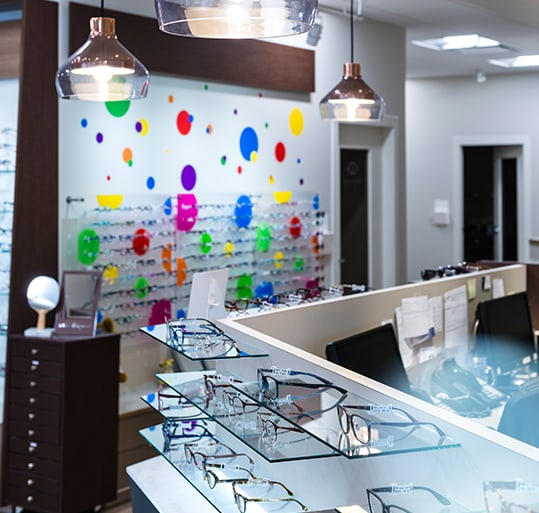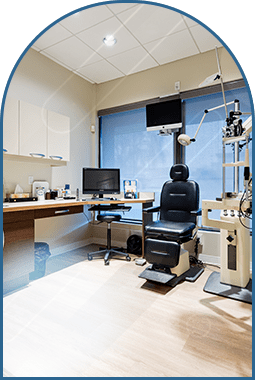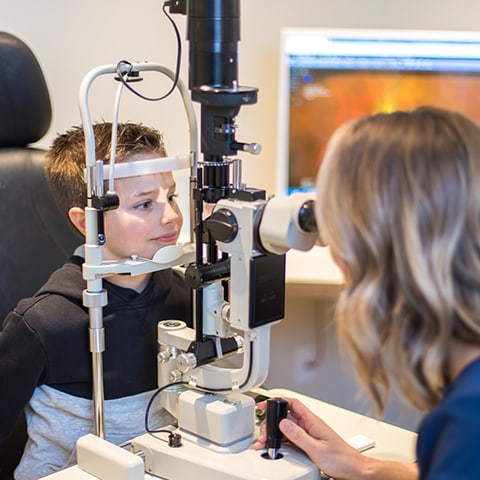Screen-Based Eye Strain
What does your technology do for you? Today, we can order dinner, buy concert tickets, chat with friends, play games, and even work, all from any device with a screen. Smartphones, gaming consoles, computers, and tablets make our lives more convenient.
But, there are some drawbacks to increased screen time. It’s almost impossible to get away from devices at school, work, or home, and as a result, many Canadians experience discomfort related to digital eye strain. Too much screen time can also affect how kids’ eyes develop, linking to an increased risk of myopia (nearsightedness).
Digital eye strain, also known as computer vision syndrome, refers to a group of ocular issues stemming from too much time spent using digital devices.
If you’re experiencing eye discomfort after staring at your screen, we can help. We’ll assess your screen habits and provide some strategies to mitigate your discomfort.
Book an appointment to find relief from digital eye strain today.
Book AppointmentSymptoms of Digital Eye Strain
There are a few common symptoms associated with digital eye strain, including:
- Dry eyes
- Headaches
- Eye strain
- Blurry vision
- Neck and shoulder pain
Often, symptoms will alleviate when you take a screen break. But, discomfort will return once you’re in front of a digital device again. To find relief in the long term, you’ll need to implement some mitigation strategies.
It’s also important to visit your optometrist to help detect any other conditions that might affect your eye comfort.
Mitigation Strategies
Adjusting your work area, taking intentional screen breaks, and ensuring you have sufficient lighting while using your digital device are all strategies that can help reduce digital eye strain.
Ergonomics
Office (or classroom) ergonomics and proper posture can help you stay comfortable while using digital devices. While you’re at your desk, be sure to sit upright with your feet flat on the floor. Your shoulders should not be rounded or hunched, and your neck should align with your torso.
Keep devices at eye level and your keyboard and mouse near enough to prevent reaching.
Remind kids to keep their backs lined up with their chairs, or imagine keeping their backs straight as a tree.
Settings
If you’re reading on your digital device, increase the font size to minimize squinting. Contrast and colour tones should also be set to maximize your comfort.
Talk to your child about what font size feels most comfortable for them and help them make appropriate contrast adjustments.
Lighting Levels
The light levels around you and on your device can help prevent digital eye strain. Turn down your screen’s brightness to match the lighting levels of your surroundings. If the light from the room is reflected in your screen, the glare can also contribute to eye strain.
Anti-glare screens are available for your device’s display, and glasses with an anti-reflective coating can help.
Remind your kids to turn on the lights in dark rooms to avoid tired eyes.
The 20-20-20 Rule
When you’re concentrating on your work, it might be challenging to take a break, but following the 20-20-20 rule can help relax your eyes. Every 20 minutes, look at something 20 feet away for 20 seconds. This helps give your eyes refocus, reducing strain.
Set a reminder on your phone or set up parental controls on your kid’s device for scheduled breaks and screen time limits.
Kids & Digital Eye Strain
Adults use screens frequently, but they’re creeping into kids' lives too. Studies show that the risk of children developing visual issues increases after 2–4 hours of screen time.
The Canadian Association of Optometrists recommends that children avoid screen time 1 hour before bedtime and never bring a screen into their bedrooms. Breaks should be encouraged frequently when kids are using screens, particularly outdoor breaks, for whole-body physical activity.
Children should have regular, comprehensive eye exams to support the health of their vision, regardless of their screen time. Schedule an appointment to support your child’s eye health today.
Book AppointmentCome Visit Us
Visit Us
We are on Harvey Avenue, and there is plenty of parking outside the clinic. Our location is wheelchair accessible! We look forward to welcoming you and your family.
Where to park?
Our Address
- 4 – 2070 Harvey Avenue
- Kelowna, BC V1Y 8P8
Contact Information
- Phone: 250-860-2020
- Fax: 250-762-9411
- Email: [email protected]
Our Hours
- Monday: 8:00 AM – 5:00 PM
- Tuesday: 8:00 AM – 5:00 PM
- Wednesday: 8:00 AM – 5:00 PM
- Thursday: 8:00 AM – 5:00 PM
- Friday: 8:00 AM – 2:30 PM
- Saturday: Closed
- Sunday: Closed

Our Google Reviews
Our Brands



















